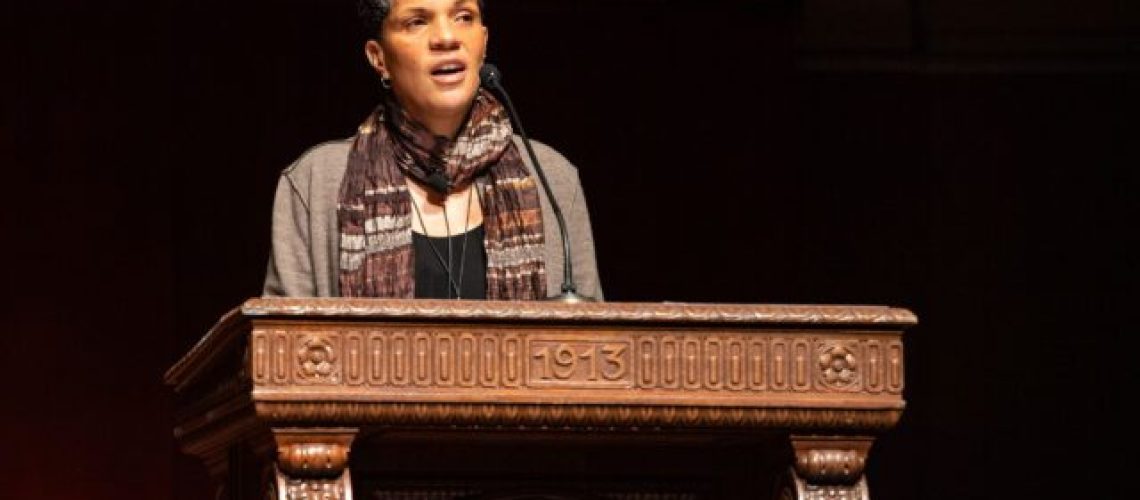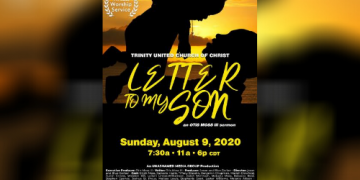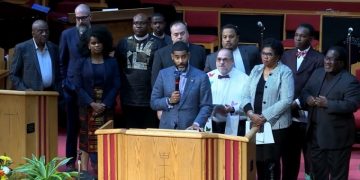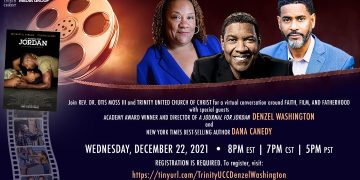As the new year brings continued threats of global war, challenges to democracy, climate change and increasingly powerful artificial intelligence, there is a paramount need for individuals to speak out and act against hate.
That was the message that author and advocate Michelle Alexander shared Jan. 15 as the memorial keynote speaker in the University of Michigan’s 2024 Rev. Dr. Martin Luther King Jr. Symposium.
“We must speak and act with courage, unprecedented courage, and with love,” Alexander said.
“The way that things change in this new year is ultimately up to us. It can be a time of great awakening; a time when these existential threats lead us to embrace our own humanity and perhaps even glimpse the spark of divinity that exists within each and every one of us and all creation.”

The annual symposium’s keynote address took place at Hill Auditorium and was also shared online via livestream.
Now in its 38th year, the MLK Symposium is one of the nation’s largest celebrations of King’s life and legacy sponsored by higher education. Themed “Transforming the Jangling Discords of Our Nation into a Beautiful Symphony,” this year’s symposium runs through mid-February with a variety of individual events.
The keynote was co-sponsored by the Stephen M. Ross School of Business and the Office of Academic Multicultural Initiatives under the Office of Diversity, Equity & Inclusion.
The symposium’s title hearkens back to King’s historic “I Have a Dream” speech, in which he said, “With this faith we will be able to transform the jangling discords of our nation into a beautiful symphony of brotherhood.”
President Santa J. Ono welcomed the packed auditorium with a call to continue King’s legacy through civic engagement and citizenship, respect and harmony, during today’s disharmony and extremism.
“For amid the racism, the persecution, the hatred of (King’s) time, he showed a better way: a way towards peace, justice and harmony. We must follow in his footsteps today,” Ono said.
“Our dedication to academic excellence is deeply intertwined with our commitment to diversity, equity and inclusion. I am convinced that we cannot be excellent without being diverse in the broadest sense of the word.”

Alexander is a legal scholar, social justice advocate, columnist at The New York Times and visiting professor at Union Theological Seminary. She also is the author of the acclaimed bestseller “The New Jim Crow: Mass Incarceration in the Age of Colorblindness.”
Citing the current violence and deaths in Gaza, the upcoming U.S. presidential election, accelerating climate change, and the dangers of AI, Alexander said humanity is on the precipice of monumental change.
“This year that has only just begun feels different. Something new is in the air,” Alexander said.
She said these challenges have a clear link to mass incarceration and police-violence issues because the “existential crisis facing our nation and our world (is) a result of treating people and all creation as disposable, as unworthy.
“This belief that through violence we can achieve a just peace in our communities and in our world is a belief that Dr. King rejected outright. He challenged us, dared us to imagine that another way is possible — not just that another world is possible, but another way to that world is possible and a moral imperative,” Alexander said.
She emphasized the need to speak out against these injustices and referenced the backlash King received when he spoke out against the Vietnam War.
Alexander said King condemned the “moral bankruptcy of a nation that does not hesitate to invest in bombs and warfare around the world that can never seem to find the dollars to eradicate poverty at home.
“(King) was right about the existential threats to our democracy and to our world. And above all, he was right about what is required of us now: to speak and act with courage and with love to oppose all forms of hate and racism, including antisemitism and Islamophobia, and to reject violence as the answer to our most profound, seemingly intractable conflicts and struggles.”
Following the keynote address, Stephen Henderson, host of the radio show “Detroit Today” and a Pulitzer Prize-winning journalist, moderated a panel discussion that, besides Alexander, included:
- Robert Sellers, Charles D. Moody Collegiate Professor and professor of psychology, LSA; faculty associate, Research Center for Group Dynamics, Institute for Social Research; and professor of education, Marsal Family School of Education.
- H. Luke Shaefer, Hermann and Amalie Kohn Professor of Social Justice and Social Policy and professor of public policy, Gerald R. Ford School of Public Policy; professor of social work, School of Social Work; director of Poverty Solutions; and faculty associate, Survey Research Center and Population Studies Center, Institute for Social Research.

When Henderson asked the panelists about bringing equality to institutions like universities, Sellers said engaging in discussions about race is necessary to tackle the issue head-on.
“If you want an institution that cares about diversity, equity and inclusion, you’re going to have to stand up for it. And you’re going to have to be active because you will get what you’re willing to accept,” Sellers said. “If we don’t show courage, as a community and through our leadership, we’re in trouble.”
When asked about the role university students can play in furthering King’s cause, Alexander said young people can be the ultimate change-makers in society.
“The youth are our hope and future … but I think it means more historically as agents of the most courageous, most ambitious and most radical change in this nation and around the world,” she said.
“It has been young people who said ‘No, not anymore, not in my name.’ And have dared — brilliantly, beautifully, righteously — to challenge the status quo, and we have never needed that courage and brilliance and daring more than we do right now.”
The symposium began with the singing of “Lift Every Voice and Sing,” often referred to as “the Black national anthem,” by Bryan Anthony Ijames and accompanied by Julian J. Goods. That was followed by a performance by Detroit-based artist and composer BLKBOK.
Other speakers at the event included:
- Tabbye Chavous, vice provost for equity and inclusion and chief diversity officer.
- Priscilla Chiangong, LSA undergraduate.
- Josephine Conti, LSA undergraduate.
- Earl Lewis, Thomas C. Holt Distinguished University Professor of History, Afroamerican and African Studies and Public Policy, director of the Center for Social Solutions, professor of history, and of Afroamerican and African Studies, LSA; and professor of public policy, Ford School.
The symposium concluded with a second performance by BLKBOK. He was joined by Felicia Webb, director of evaluation and assessment for the Office of Diversity, Equity & Inclusion, to sing a Stevie Wonder tribute in honor of King’s 95th birthday.



- Tags:






